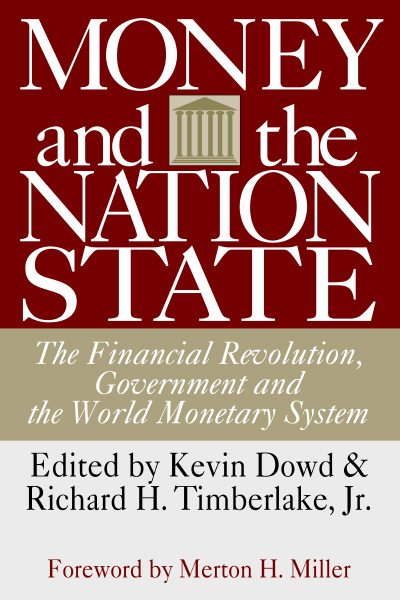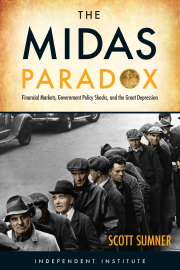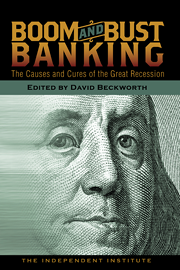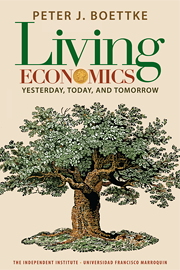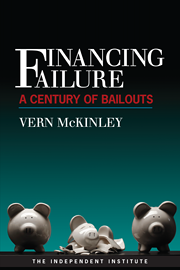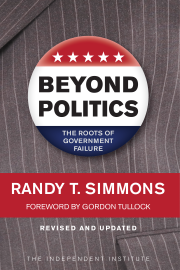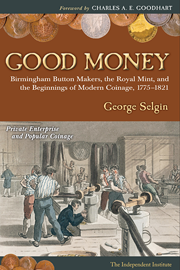| List Price: | ||
| Price: | $21.95 | |
| Discount: | $3.00 (Save 12%) |
| List Price: | ||
| Price: | $21.95 | |
| Discount: | $3.00 (Save 12%) |
Overview
Are monetary and banking problems due to a few misguided policies or incompetent managers? Or are there fundamental flaws in monetary and financial institutions, principally central banks and the legal and monetary frameworks that accompany them?
In this comprehensive book, seventeen distinguished scholars examine the history of modern monetary and banking arrangements, their major problems, and possible reforms. They also explore how political interference in monetary institutions has undermined economic stability and prosperity and produced international conflict as a by-product. They show how monetary nationalism—the promotion of the monetary goals of the nation state—necessarily invites economic discoordination because it interferes with the equilibrating operation of market forces.
The authors also outline the reforms necessary to create monetary, financial, and banking systems free of the episodic inflation, devaluation, debt crises, and exchange rate volatility that have plagued the twentieth century.
This book is an invaluable resource for scholars, students, policy makers, business leaders, and everyone interested in economic progress.
Contents
Foreword
Merton H. Miller
Introduction
Kevin Dowd and Richard H. Timberlake, Jr.
Section I: History of the Modern International Monetary System
- An Evolutionary Theory of the State Monopoly Over Money
David Glasner - National Sovereignty and International Monetary Regimes
Frank van Dun - The History of the International Monetary System
Leland B. Yeager - Gold Exchange Standard in the Inter-War Years
Murray N. Rothbard - Gold Standard Policy and Limited Government
Richard H. Timberlake, Jr.
Section II: Modern Money and Central Banking
- Financial Policy in the Post-Bretton Woods Period
Thomas F. Cargill - Banking and the Global Evolution of the 100% Deposit Guarantees
Genie D. Short and Kenneth J. Robinson - The IMF’s Destructive Recipe—Raising Tax Rates and Falling Currencies
Alan Reynolds - Global Economic Integration—Trends and Alternative Policy Responses
Robert E. Keleher
Section III: Foundations for Monetary and Banking Reform
- The Political Economy of Discretionary Monetary Regimes
Richard C. K. Burdekin, Jilleen Westbrook, and Thomas D. Willet - The Misguided Drive Toward European Monetary Union—Pitfalls of Monetary Central Planning
Kevin Dowd - Monetary Nationalism Reconsidered
Lawrence H. White - Currency Boards and Free Banking
Steve H. Hanke and Kurt Schuler
Index
About the Authors
Detailed Summary
- Experts increasingly acknowledge that the world’s monetary and banking problems are not due to a few misguided policies or incompetent people, but rather to basic flaws in the system of arbitrary government currencies and banking. Government institutions simply lack the knowledge and incentives to effectively replace the decision-making of millions of market participants.
- The international gold standard existed from the late 19th century until World War I, a period of unprecedented economic progress. A commodity standard combined with free-market banking would coordinate economic activity even better.
- The economic upheaval of the 1930s had its roots in Britain’s attempt after World War I to restore the prestige of the battered pound sterling and the U.S. Federal Reserve System’s dubious and inflationary campaign of support.
- Bank deposit guarantees created in response to the Great Depression—far from solving problems of the banking industry—created their own problems. Banking deregulation and the abolition of federal deposit insurance can better protect the safety and soundness of the banking system.
- The International Monetary Fund (IMF) has harmed developing countries by insisting they devalue their currencies and maintain high taxes. And, there are no true IMF “success stories.”
- Western Europe’s move toward monetary integration is ill-considered in the wake of collapsing central planning elsewhere. Instead, a rules-based form of policy coordination is far superior.
Merton Miller writes in his foreword to Money and the Nation State that this book “provides the essential framework for those willing to return to first principles in thinking about the role of monetary arrangements in economic life.”
This volume, edited by noted financial economists Kevin Dowd and Richard Timberlake, gathers the work of seventeen top scholars on all-important aspects of monetary theory and history. As the editors note in their introduction, a growing list of observers now acknowledges that the world’s financial problems are systemic.
History of the International Monetary SystemDavid Glasner opens by arguing that economists have not seriously challenged government’s monopoly on money, which has produced a history of “debasement, depreciation, and devaluation.” That might be understandable if money were a “natural monopoly,” but Glasner notes that money has none of the features of one. Thus a better, more political explanation for government monetary sovereignty must be the case.
Frank van Dun’s chapter then follows by putting the logic of sovereignty under the microscope. Beginning with ancient rulers’ assumption of the power to coin money, he traces how the theory of state sovereignty has, over time, expanded to justify all state activities, based on the doctrines of “implied powers” and “public interest.”
Leland Yeager opens with a brief description of the early metallic standards, noting that, until the Civil War, the United States had issued no paper money. He then moves to an examination of the gold standard and its place in bringing about an unprecedented rise in wealth, up until the intrusions of government regulation and monetary devaluation, beginning in the 1920s and continuing through the post-World War II system of fixed exchange rates known as Bretton Woods.
The late Murray Rothbard discusses in depth Britain’s decision to restore the pound sterling to its pre-World War I par, despite its inflationary war policies, and the role the U.S. Federal Reserve played in this fateful decision. Rothbard looks closely at New York Federal Reserve Bank Governor Benjamin Strong, who presided over an inflationary policy designed to help Britain. Rothbard relates this story in fascinating detail, revealing the real human drama of inflationary politics.
Richard Timberlake then studies the relationship between gold and limited government, concluding that the framers of the Constitution gave the federal government power only to determine the weight that would constitute a dollar. Timberlake argues that those who read the Constitution to mean the federal government can create paper money are interpreting it “frivolously.”
Modern Money and Central BankingThomas Cargill opens Section II of the book with an examination of U.S. financial policy since the fall of the Bretton Woods regime, which gave way to an era of incomplete and inequitable deregulation which, along with bad tax policy, helped produce the savings and loan crisis. This shameful response to the insolvency of the industry—including an increase in federal deposit insurance—only made matters far worse.
Genie Short and Kenneth Robinson focus on the key issue of deposit insurance, tracing the history of deposit guarantees, and arguing that government guarantees have forced the financial sector to price risk incorrectly and make depositors complacent. The authors call for a reassessment of what constitutes an actual financial crisis in order to remove “a true stumbling block to financial reform,” which would include an end to reliance on government for deposit guarantees.
Alan Reynolds examines this “moral hazard” problem in the International Monetary Fund, reporting that he can find no example of IMF intervention “unambiguously improving an economy’s performance over a sustained period.” Instead, he notes, the IMF typically requires borrowing nations to engage in “destructive devaluation and suffocating taxation,” destroying economic growth.
Robert Keleher follows up by looking at global economic integration. He attributes the new economic environment to financial deregulation and the telecommunications and information processing revolution. According to Keleher, the choice facing the new world market is, once again, between centralized and decentralized decision-making, with decentralization clearly superior.
Foundations for Monetary and Banking ReformRichard Burdekin, Jilleen Westbrook, and Thomas Willett point out how monetary expansion benefits politicians through short-run increases in employment and drops in interest rates, all while longer term damage is being done. Focusing on suggested reforms, the authors conclude that exchange rate pegging alone is not a good idea, since it is a rigid price control, but look favorably on central bank independence, so long as governments view it as essentially irreversible.
Kevin Dowd addresses the irony of witnessing collapsing central planning in central and eastern Europe alongside the formation of the European Community super-state. He concludes that the attempt to create a European Federal Reserve System is “a classic case study of the fatal conceit of would-be central planners who have the supreme arrogance to think they can impose their ‘will’ on peoples and markets alike...”
Lawrence White’s chapter considers alternative forms of international monetary regimes—namely free banking versus world central banking. While taking up Nobel Laureate economist F.A. Hayek’s argument against both monetary nationalism and an international fiat currency, White disagrees with Hayek’s endorsement of an international central bank as a solution, noting that problems with national central banking would also be present with an international central bank. White suggests instead that a system of free-market banking is the preferred alternative.
The book concludes with Steve Hanke and Kurt Schuler’s discussion of currency boards—institutions that issue notes and coins convertible into a foreign currency or commodity at a fixed exchange rate. The authors point to these boards’ excellent records in creating public confidence, even during domestic instability, and argue that currency boards depoliticize the money supply.
Offering practical, proven and economically sound directions for reform, Money and the Nation State is undoubtedly the most comprehensive analysis and critique of international monetary, banking and financial issues available today. The result, as Merton Miller states, is a significant contribution to the “careful reconsideration of today’s failed monetary orthodoxies [that] is clearly overdue.”
Praise
“Money and the Nation State is superb. It is an extraordinarily valuable and insightful book about the relationship of central banking to a variety of different problems, both domestic and international, and explores in an intelligent way the implications for policy of the fact that governments have asserted a monopoly in the emission and regulation of money during modern times. The book is extraordinarily intelligent, well-informed and insightful. Money and the Nation State provides a useful supplement to much existing work which continues to apply a Keynesian framework to the understanding of money and the nation state.”
—Geoffrey P. Miller, Chairman, Center for the Study of Central Banks, University of Chicago
“At a time when Europe is preparing for a single currency managed and controlled by one central bank, the book, Money and the Nation State, is of eminent importance and of extraordinary interest. Whether the European Monetary Union will become a success or a failure will depend very much on the structure and policy of the future European Central Bank. All policymakers who have to take far-reaching decisions in Europe should read this book.”
—Karl Otto Pöhl, Former President, Deutsche Bundesbank, Germany
“These are essays with an attitude. The tone of Money and the Nation State is set in a brief foreword by Merton Miller, a Nobel laureate in economics, who speaks of a need 'to return to first principles in thinking about the role of monetary arrangements in economic life.' At issue is the role of the nation-state in the creation and management of money a role that for the authors here is inevitably politicized and often downright pernicious. All share a fundamentalist belief in the superiority of markets over governments in the workings of financial institutions. Central banks are not part of the solution; they are part of the problem of persistent inflation and banking instability. The 13 essays in this eclectic collection cover a wide range of topics, including five chapters focused on historical issues, followed by four chapters on various aspects of modern monetary systems and central banking and, finally, four chapters on different proposals for monetary or banking reform. Though almost all are written by economists, for the most part they avoid formal methodology and rely mainly on plain prose to make their key points. (In other words, they can be understood even by non-economists.) Helpful bibliographies accompany each chapter, and the central arguments of the individual authors are ably summarized in an effective introduction by the editors. . . . Yet, for all the diversity of these essays, there is a consistent thread that unites them: a common distrust of politics, which all the authors regard as a fundamental constraint on the wise management of money. Once governments take control of the printing presses, inflationary excesses are bound to follow. The only way to ensure sound currency is to eliminate 'political interference'—in one way or another, to hem in the ability of politicians or central bankers to manipulate monetary conditions to serve their own dubious ends. Opinions differ on how this might be accomplished. Some contributors envision the possibility of constitutionally prescribed systems that would substitute the rule of law for discretionary monetary policy. Others see no hope at all until central banks can be wholly eliminated, paving the way for free banking and the competitive creation of money by the private sector as long advocated by the Austrian economist Friedrich Hayek. Political scientists may regard such dismal views of public policy as naive, perhaps even laughable. The question is: Can such ideas be ignored?”
—Journal of Politics
“Money and the Nation State is interesting reading. The book should serve as a red flag to government economic policymakers who may be tempted to intervene in markets under their purview in attempts to ‘improve’ or fine tune the outcomes. Money and the Nation State reinforces the dictum for policymakers to ‘do no harm’ by trying less and reminds us that, while market failures occur, they tend to be far less severe and damaging than government failures.”
—George G. Kaufman, John F. Smith, Jr., Professor of Finance and Economics, Loyola University, Chicago
“If society defines the rules of the game and sets financial markets free to play, only good things will follow. In the past, not everyone has been entirely comfortable with this argument. However, if the careful scholarship and argumentation between the covers of Money and the Nation State fail to convince the skeptics, nothing will.”
—Barry Eichengreen, John L. Simpson Professor of Economics and Political Science, University of California
“In Money and the Nation State, Dowd and Timberlake have organized a very interesting book that effectively addresses the important monetary and financial issues facing the global economy today. They usefully document the evolution of our modern monetary system and then develop a provocative agenda for change that should be examined at the highest levels of policy making.”
—Manuel H. Johnson, former Vice Chairman, Federal Reserve System
“The authors of this book address the problems of contemporary banking instability and monetary policy-making in a period of intense restructuring in world finance. The immediate sources of these problems are posited to reside not with poor decision-making by public and private individuals, but with the institutions and structures of world finance which constrain more market-oriented arrangements. Three principal, interrelated arguments emerge through a diverse collection of essays. First, the institutions of central banking, regulation and supervision are held to have developed as a result of the processes of state-making in the past. Second, this political interference in money and finance is believed to have detrimental consequences for the economic welfare of individuals in the present. Third, it is suggested that contemporary monetary policy-making should exist within a legal framework which prevents the influences of government intervention and the political business cycle. . . . In the context of the volatility and uncertainty of contemporary world finance, Money and the Nation State undoubtedly provides an ambitious and important expression of the neo-classical liberal agenda for reform. . . . On the one hand, in line with neo-classical reasoning, solutions to the problems of contemporary money and finance are propounded which effectively follow from a belief in the separation of politics and economics, states and markets. On the other hand, the criticisms made of state intervention in different periods and across diverse issue areas collectively serve to illustrate that the dynamics of money and finance have been and continue to be shaped by the intersection of states and markets. Somewhat paradoxically, then, it is the essential inseparability of politics and economics which is underlined by a volume which seeks to advance their separation in money and finance. Genuine political economy approaches are likely to generate understandings of money and finance which yield realistic reform proposals.”
—International Affairs
“With continuing advances in technology, money—who controls its creation—has become a ‘hot’ topic. Money and the Nation State makes a powerful case that the time has come for the invisible hand of the market to replace the visible hands of central banks in regulating the supply of money. Policymakers may disagree with this view, but they should not ignore the cogently argued positions advanced in this important book.”
—Robert E. Litan, Director of Economic Studies, The Brookings Institution
“Money and the Nation State goes to the heart of an inherent conflict between governments and the private sector over the control of money. Should the government reserve the right to inflate the national currency or should private citizens demand a stable monetary unit of account to serve as the meaningful foundation for voluntary economic transactions? Dowd and Timberlake have brilliantly assembled an impressive array of powerful thinkers at a time when headlines concerning international monetary arrangements are daily appearing in the world’s major newspapers. Timely and compelling, this volume is an indispensable intellectual handbook for serious scholars as well as policymakers and members of the business community; indeed, it lays out the important issues at stake for everyone who uses money.”
—Judy Shelton, former Professor of International Finance, DUXX, Monterrey, Mexico
“This book consists of 13 essays by 18 economists, and a foreword contributed by Merton H. Miller. . . . Generally speaking, these essays share a simple method. They first assert as self-evident the superiority of markets over governments. They then offer the case of money, or banking, or international financial arrangements, as previously unexplored instance of this rule.”
—James K. Galbraith, Journal of Economic History
“The common theme of the authors of Money and the Nation State is that money has to be removed from politics. Nothing is gained by substituting international for national politics. The issue is how to protect individual freedom against the power of the state. The authors of this volume discuss two types of solutions: monetary constitutionalism and potential competition. The two are not mutually exclusive. They can reinforce each other. The book does not only provide a comprehensive overview of the problem and its solutions. It is bristling with important new ideas. It is an outstanding contribution to a thriving field of politco-economic research.”
—Roland Vaubel, Professor of Economics, University of Mannheim, Germany
“Money and the Nation State represents an important contribution because it provides the essential framework for those willing to return to first principles in thinking about the role of monetary arrangements in economic life. . . . The contributors to the volume all begin from Austrian premises and trace the implication of those premises for modern monetary arrangements. Most show that intervention leads to sub-optimal economic outcomes, and many argue that it leads to usurpation of economic and political rights. In some cases, the point is overstated, but in some of the more reflective sections, the message is clear and powerful.”
—Howard Bodenhorn, E-NET Book Review
“Good wine takes time to mature. One of my colleagues argues one should put away empirical articles for ten years before reviewing these, and proceed to publication only if the results still hold up. This reviewer has not so good an excuse for the current belated review, but the quality of Money and the Nation State shows that since it is as relevant and up to date today, as it was when it was sent to me a few years back. This intriguing book certainly passes the acid test of my colleague. . . . The book . . . makes great reading and I hope many of this journal’s readers will order it now. It is not too late.”
—The Economic Journal
“Money and the Nation State would be a valuable guide for general readers and students not well versed in money and banking history and principles. But even those who are fairly well read in these areas will find something of interest here.”
—Omotunde E. G. Johnson, Finance and Development, International Monetary Fund
“Money and the Nation State is a timely and excellent guide to understanding what has been happening to financial systems over time and in various parts of the world. Furthermore, it discusses specific ways in which to reform these systems to promote stable economic growth and development. The editors have themselves made important contributions elsewhere that address these issues. Here they have assembled an impressive group of scholars who provide informative analyses of ways to restructure financial systems around the globe. . . . All in all, this book provides a wealth of information essential for understanding the importance of financial and monetary systems and potential ways in which these systems could be restructured to promote stable economic growth and development. Regardless of whether one agrees with any specific proposals, the papers collectively force one to reassess more clearly than ever one’s views about the timely and important issues being addressed.”
—Journal of Policy Analysis and Management
Author
Kevin Dowd is Professor of Financial Economics, Sheffield University, and Richard H. Timberlake, Jr., is Professor of Economics (Retired), University of Georgia.
News
| “Why I Am Voting For Brexit,” by Research Fellow Kevin Dowd in The Daily Caller | Thu., Jun. 23, 2016 |

